Practical Theology: Reflexivity, Tradition, and Christopraxis Analysis
VerifiedAdded on 2022/10/01
|21
|6745
|100
Essay
AI Summary
This essay delves into the realm of practical theology, examining the interplay of reflexivity, tradition, and Christopraxis. It begins by exploring the concept of reflexivity within theological reflection, discussing its relevance to personal, social, and institutional levels, and highlighting its connection to the understanding of tradition and modernity. The essay then transitions to the formal practical theological method, providing an overview of the discipline. The analysis further extends to the concept of Christopraxis, offering a comprehensive understanding of its role within the framework of practical theology. The paper concludes by emphasizing the significance of empirical work in the field, thereby understanding the importance of theology and the need for practical empirical work within practical theology.
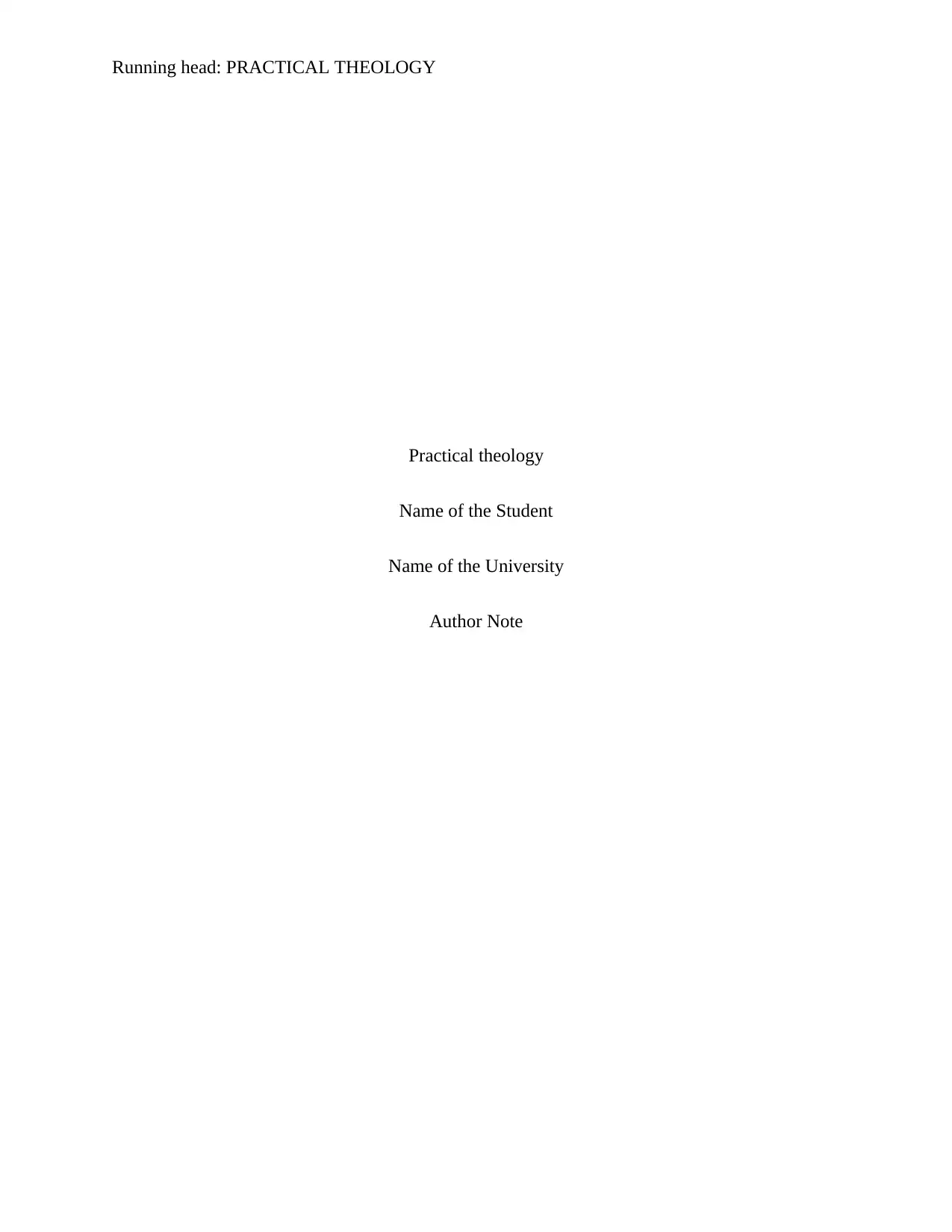
Running head: PRACTICAL THEOLOGY
Practical theology
Name of the Student
Name of the University
Author Note
Practical theology
Name of the Student
Name of the University
Author Note
Paraphrase This Document
Need a fresh take? Get an instant paraphrase of this document with our AI Paraphraser
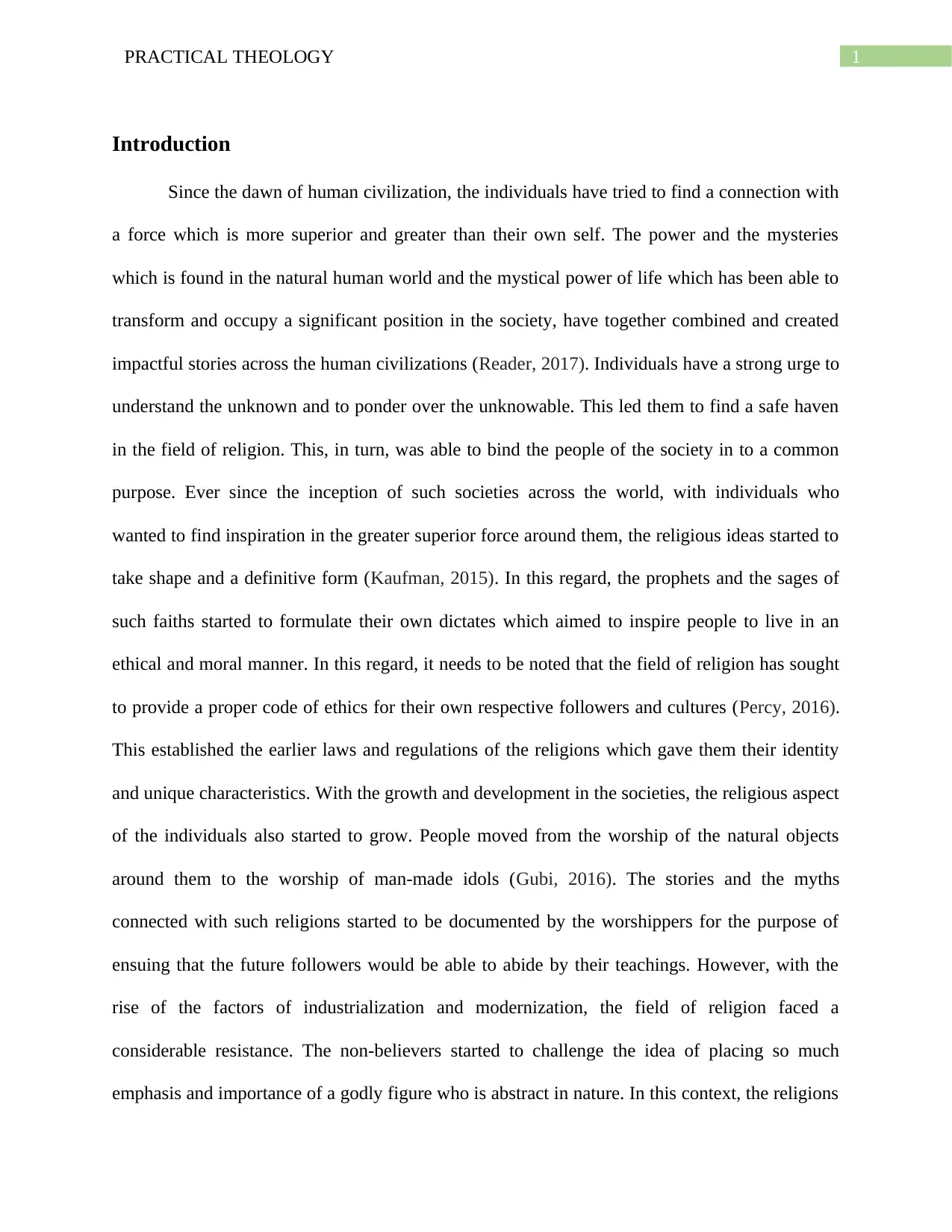
1PRACTICAL THEOLOGY
Introduction
Since the dawn of human civilization, the individuals have tried to find a connection with
a force which is more superior and greater than their own self. The power and the mysteries
which is found in the natural human world and the mystical power of life which has been able to
transform and occupy a significant position in the society, have together combined and created
impactful stories across the human civilizations (Reader, 2017). Individuals have a strong urge to
understand the unknown and to ponder over the unknowable. This led them to find a safe haven
in the field of religion. This, in turn, was able to bind the people of the society in to a common
purpose. Ever since the inception of such societies across the world, with individuals who
wanted to find inspiration in the greater superior force around them, the religious ideas started to
take shape and a definitive form (Kaufman, 2015). In this regard, the prophets and the sages of
such faiths started to formulate their own dictates which aimed to inspire people to live in an
ethical and moral manner. In this regard, it needs to be noted that the field of religion has sought
to provide a proper code of ethics for their own respective followers and cultures (Percy, 2016).
This established the earlier laws and regulations of the religions which gave them their identity
and unique characteristics. With the growth and development in the societies, the religious aspect
of the individuals also started to grow. People moved from the worship of the natural objects
around them to the worship of man-made idols (Gubi, 2016). The stories and the myths
connected with such religions started to be documented by the worshippers for the purpose of
ensuing that the future followers would be able to abide by their teachings. However, with the
rise of the factors of industrialization and modernization, the field of religion faced a
considerable resistance. The non-believers started to challenge the idea of placing so much
emphasis and importance of a godly figure who is abstract in nature. In this context, the religions
Introduction
Since the dawn of human civilization, the individuals have tried to find a connection with
a force which is more superior and greater than their own self. The power and the mysteries
which is found in the natural human world and the mystical power of life which has been able to
transform and occupy a significant position in the society, have together combined and created
impactful stories across the human civilizations (Reader, 2017). Individuals have a strong urge to
understand the unknown and to ponder over the unknowable. This led them to find a safe haven
in the field of religion. This, in turn, was able to bind the people of the society in to a common
purpose. Ever since the inception of such societies across the world, with individuals who
wanted to find inspiration in the greater superior force around them, the religious ideas started to
take shape and a definitive form (Kaufman, 2015). In this regard, the prophets and the sages of
such faiths started to formulate their own dictates which aimed to inspire people to live in an
ethical and moral manner. In this regard, it needs to be noted that the field of religion has sought
to provide a proper code of ethics for their own respective followers and cultures (Percy, 2016).
This established the earlier laws and regulations of the religions which gave them their identity
and unique characteristics. With the growth and development in the societies, the religious aspect
of the individuals also started to grow. People moved from the worship of the natural objects
around them to the worship of man-made idols (Gubi, 2016). The stories and the myths
connected with such religions started to be documented by the worshippers for the purpose of
ensuing that the future followers would be able to abide by their teachings. However, with the
rise of the factors of industrialization and modernization, the field of religion faced a
considerable resistance. The non-believers started to challenge the idea of placing so much
emphasis and importance of a godly figure who is abstract in nature. In this context, the religions
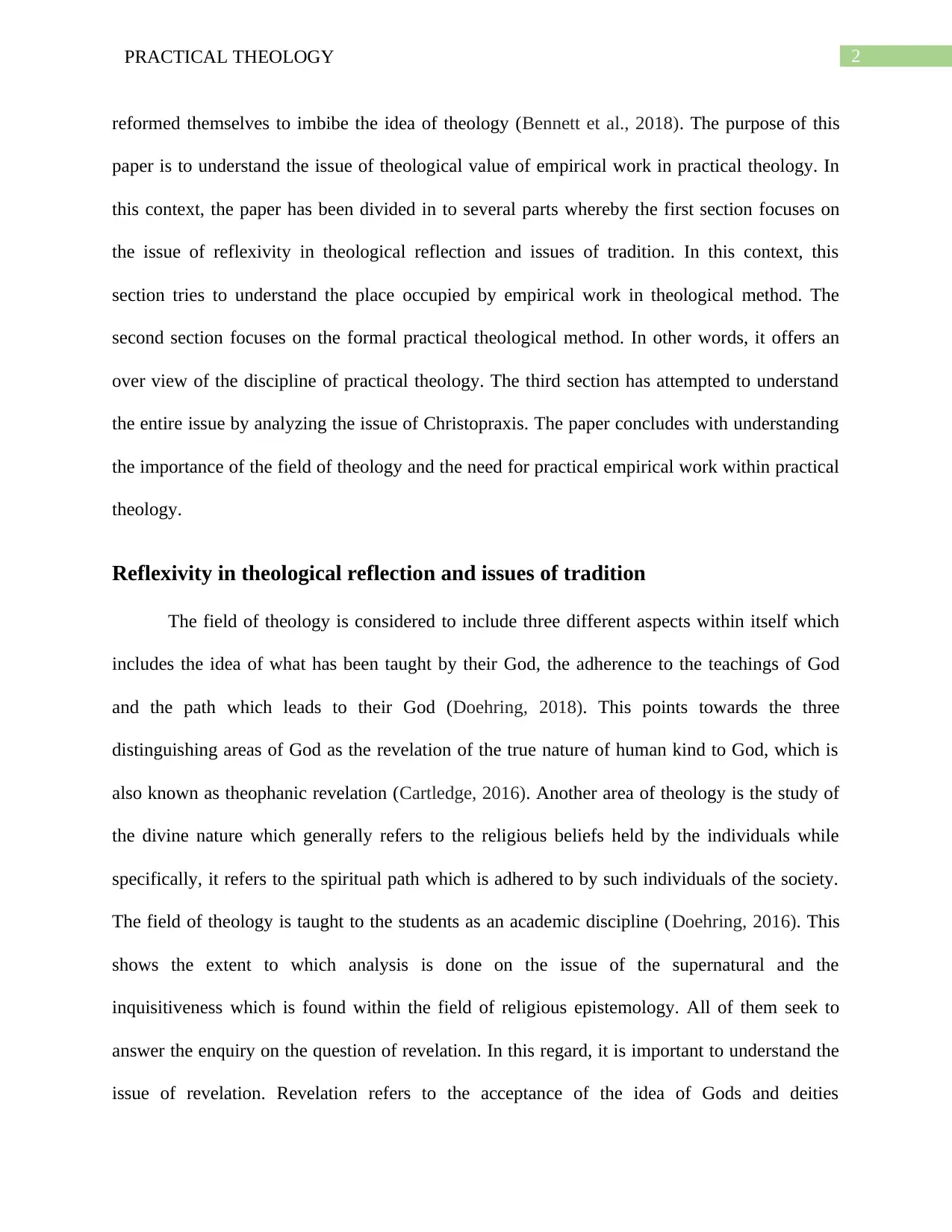
2PRACTICAL THEOLOGY
reformed themselves to imbibe the idea of theology (Bennett et al., 2018). The purpose of this
paper is to understand the issue of theological value of empirical work in practical theology. In
this context, the paper has been divided in to several parts whereby the first section focuses on
the issue of reflexivity in theological reflection and issues of tradition. In this context, this
section tries to understand the place occupied by empirical work in theological method. The
second section focuses on the formal practical theological method. In other words, it offers an
over view of the discipline of practical theology. The third section has attempted to understand
the entire issue by analyzing the issue of Christopraxis. The paper concludes with understanding
the importance of the field of theology and the need for practical empirical work within practical
theology.
Reflexivity in theological reflection and issues of tradition
The field of theology is considered to include three different aspects within itself which
includes the idea of what has been taught by their God, the adherence to the teachings of God
and the path which leads to their God (Doehring, 2018). This points towards the three
distinguishing areas of God as the revelation of the true nature of human kind to God, which is
also known as theophanic revelation (Cartledge, 2016). Another area of theology is the study of
the divine nature which generally refers to the religious beliefs held by the individuals while
specifically, it refers to the spiritual path which is adhered to by such individuals of the society.
The field of theology is taught to the students as an academic discipline (Doehring, 2016). This
shows the extent to which analysis is done on the issue of the supernatural and the
inquisitiveness which is found within the field of religious epistemology. All of them seek to
answer the enquiry on the question of revelation. In this regard, it is important to understand the
issue of revelation. Revelation refers to the acceptance of the idea of Gods and deities
reformed themselves to imbibe the idea of theology (Bennett et al., 2018). The purpose of this
paper is to understand the issue of theological value of empirical work in practical theology. In
this context, the paper has been divided in to several parts whereby the first section focuses on
the issue of reflexivity in theological reflection and issues of tradition. In this context, this
section tries to understand the place occupied by empirical work in theological method. The
second section focuses on the formal practical theological method. In other words, it offers an
over view of the discipline of practical theology. The third section has attempted to understand
the entire issue by analyzing the issue of Christopraxis. The paper concludes with understanding
the importance of the field of theology and the need for practical empirical work within practical
theology.
Reflexivity in theological reflection and issues of tradition
The field of theology is considered to include three different aspects within itself which
includes the idea of what has been taught by their God, the adherence to the teachings of God
and the path which leads to their God (Doehring, 2018). This points towards the three
distinguishing areas of God as the revelation of the true nature of human kind to God, which is
also known as theophanic revelation (Cartledge, 2016). Another area of theology is the study of
the divine nature which generally refers to the religious beliefs held by the individuals while
specifically, it refers to the spiritual path which is adhered to by such individuals of the society.
The field of theology is taught to the students as an academic discipline (Doehring, 2016). This
shows the extent to which analysis is done on the issue of the supernatural and the
inquisitiveness which is found within the field of religious epistemology. All of them seek to
answer the enquiry on the question of revelation. In this regard, it is important to understand the
issue of revelation. Revelation refers to the acceptance of the idea of Gods and deities
⊘ This is a preview!⊘
Do you want full access?
Subscribe today to unlock all pages.

Trusted by 1+ million students worldwide
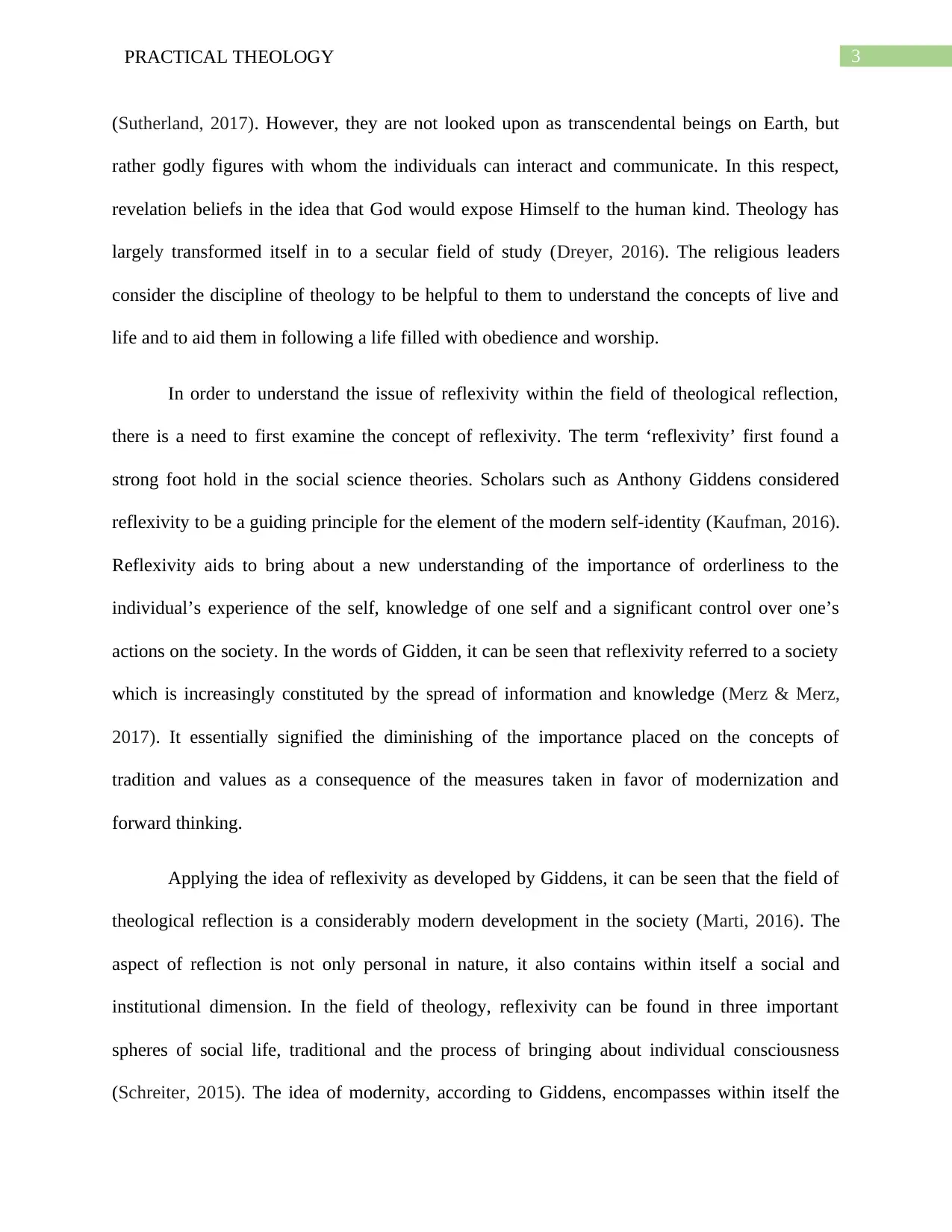
3PRACTICAL THEOLOGY
(Sutherland, 2017). However, they are not looked upon as transcendental beings on Earth, but
rather godly figures with whom the individuals can interact and communicate. In this respect,
revelation beliefs in the idea that God would expose Himself to the human kind. Theology has
largely transformed itself in to a secular field of study (Dreyer, 2016). The religious leaders
consider the discipline of theology to be helpful to them to understand the concepts of live and
life and to aid them in following a life filled with obedience and worship.
In order to understand the issue of reflexivity within the field of theological reflection,
there is a need to first examine the concept of reflexivity. The term ‘reflexivity’ first found a
strong foot hold in the social science theories. Scholars such as Anthony Giddens considered
reflexivity to be a guiding principle for the element of the modern self-identity (Kaufman, 2016).
Reflexivity aids to bring about a new understanding of the importance of orderliness to the
individual’s experience of the self, knowledge of one self and a significant control over one’s
actions on the society. In the words of Gidden, it can be seen that reflexivity referred to a society
which is increasingly constituted by the spread of information and knowledge (Merz & Merz,
2017). It essentially signified the diminishing of the importance placed on the concepts of
tradition and values as a consequence of the measures taken in favor of modernization and
forward thinking.
Applying the idea of reflexivity as developed by Giddens, it can be seen that the field of
theological reflection is a considerably modern development in the society (Marti, 2016). The
aspect of reflection is not only personal in nature, it also contains within itself a social and
institutional dimension. In the field of theology, reflexivity can be found in three important
spheres of social life, traditional and the process of bringing about individual consciousness
(Schreiter, 2015). The idea of modernity, according to Giddens, encompasses within itself the
(Sutherland, 2017). However, they are not looked upon as transcendental beings on Earth, but
rather godly figures with whom the individuals can interact and communicate. In this respect,
revelation beliefs in the idea that God would expose Himself to the human kind. Theology has
largely transformed itself in to a secular field of study (Dreyer, 2016). The religious leaders
consider the discipline of theology to be helpful to them to understand the concepts of live and
life and to aid them in following a life filled with obedience and worship.
In order to understand the issue of reflexivity within the field of theological reflection,
there is a need to first examine the concept of reflexivity. The term ‘reflexivity’ first found a
strong foot hold in the social science theories. Scholars such as Anthony Giddens considered
reflexivity to be a guiding principle for the element of the modern self-identity (Kaufman, 2016).
Reflexivity aids to bring about a new understanding of the importance of orderliness to the
individual’s experience of the self, knowledge of one self and a significant control over one’s
actions on the society. In the words of Gidden, it can be seen that reflexivity referred to a society
which is increasingly constituted by the spread of information and knowledge (Merz & Merz,
2017). It essentially signified the diminishing of the importance placed on the concepts of
tradition and values as a consequence of the measures taken in favor of modernization and
forward thinking.
Applying the idea of reflexivity as developed by Giddens, it can be seen that the field of
theological reflection is a considerably modern development in the society (Marti, 2016). The
aspect of reflection is not only personal in nature, it also contains within itself a social and
institutional dimension. In the field of theology, reflexivity can be found in three important
spheres of social life, traditional and the process of bringing about individual consciousness
(Schreiter, 2015). The idea of modernity, according to Giddens, encompasses within itself the
Paraphrase This Document
Need a fresh take? Get an instant paraphrase of this document with our AI Paraphraser
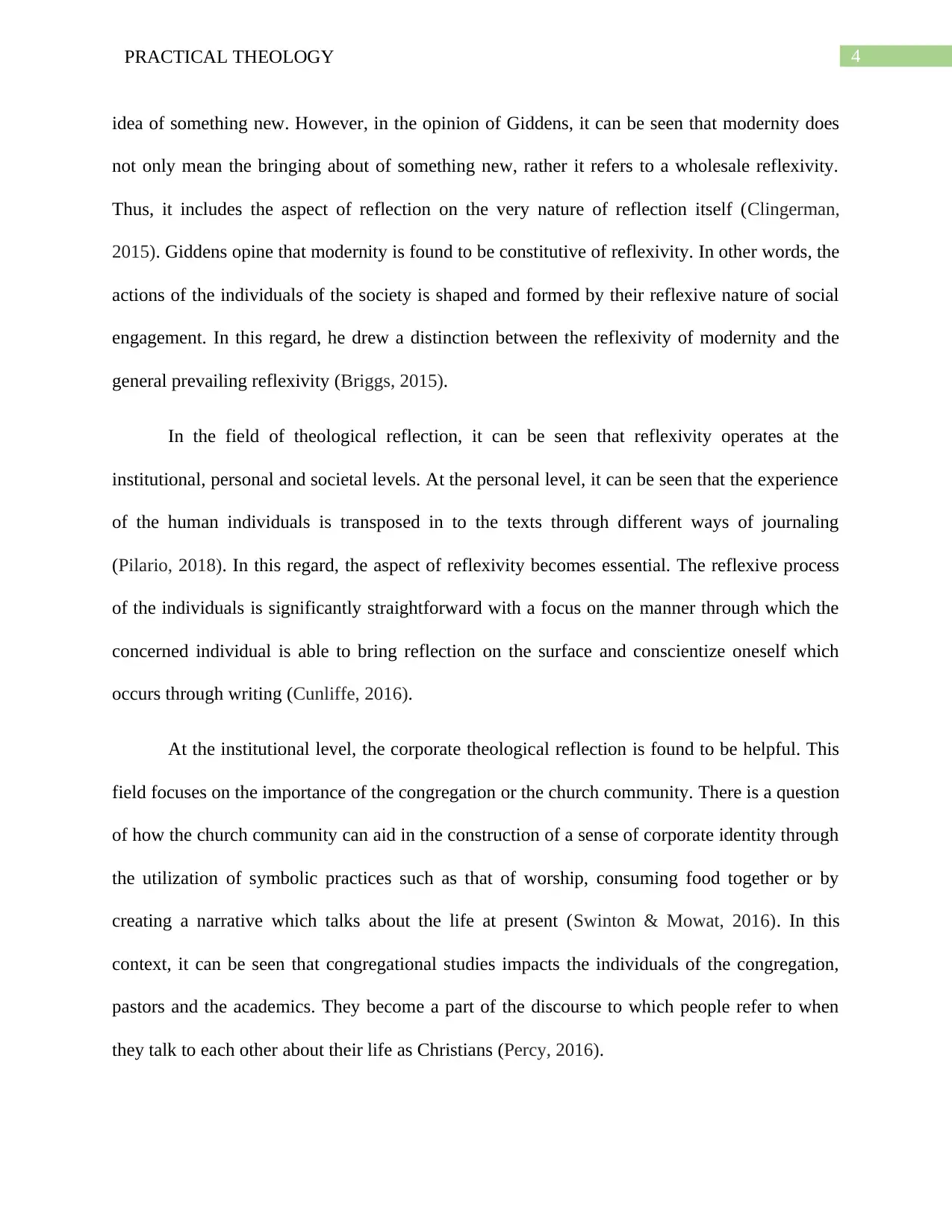
4PRACTICAL THEOLOGY
idea of something new. However, in the opinion of Giddens, it can be seen that modernity does
not only mean the bringing about of something new, rather it refers to a wholesale reflexivity.
Thus, it includes the aspect of reflection on the very nature of reflection itself (Clingerman,
2015). Giddens opine that modernity is found to be constitutive of reflexivity. In other words, the
actions of the individuals of the society is shaped and formed by their reflexive nature of social
engagement. In this regard, he drew a distinction between the reflexivity of modernity and the
general prevailing reflexivity (Briggs, 2015).
In the field of theological reflection, it can be seen that reflexivity operates at the
institutional, personal and societal levels. At the personal level, it can be seen that the experience
of the human individuals is transposed in to the texts through different ways of journaling
(Pilario, 2018). In this regard, the aspect of reflexivity becomes essential. The reflexive process
of the individuals is significantly straightforward with a focus on the manner through which the
concerned individual is able to bring reflection on the surface and conscientize oneself which
occurs through writing (Cunliffe, 2016).
At the institutional level, the corporate theological reflection is found to be helpful. This
field focuses on the importance of the congregation or the church community. There is a question
of how the church community can aid in the construction of a sense of corporate identity through
the utilization of symbolic practices such as that of worship, consuming food together or by
creating a narrative which talks about the life at present (Swinton & Mowat, 2016). In this
context, it can be seen that congregational studies impacts the individuals of the congregation,
pastors and the academics. They become a part of the discourse to which people refer to when
they talk to each other about their life as Christians (Percy, 2016).
idea of something new. However, in the opinion of Giddens, it can be seen that modernity does
not only mean the bringing about of something new, rather it refers to a wholesale reflexivity.
Thus, it includes the aspect of reflection on the very nature of reflection itself (Clingerman,
2015). Giddens opine that modernity is found to be constitutive of reflexivity. In other words, the
actions of the individuals of the society is shaped and formed by their reflexive nature of social
engagement. In this regard, he drew a distinction between the reflexivity of modernity and the
general prevailing reflexivity (Briggs, 2015).
In the field of theological reflection, it can be seen that reflexivity operates at the
institutional, personal and societal levels. At the personal level, it can be seen that the experience
of the human individuals is transposed in to the texts through different ways of journaling
(Pilario, 2018). In this regard, the aspect of reflexivity becomes essential. The reflexive process
of the individuals is significantly straightforward with a focus on the manner through which the
concerned individual is able to bring reflection on the surface and conscientize oneself which
occurs through writing (Cunliffe, 2016).
At the institutional level, the corporate theological reflection is found to be helpful. This
field focuses on the importance of the congregation or the church community. There is a question
of how the church community can aid in the construction of a sense of corporate identity through
the utilization of symbolic practices such as that of worship, consuming food together or by
creating a narrative which talks about the life at present (Swinton & Mowat, 2016). In this
context, it can be seen that congregational studies impacts the individuals of the congregation,
pastors and the academics. They become a part of the discourse to which people refer to when
they talk to each other about their life as Christians (Percy, 2016).
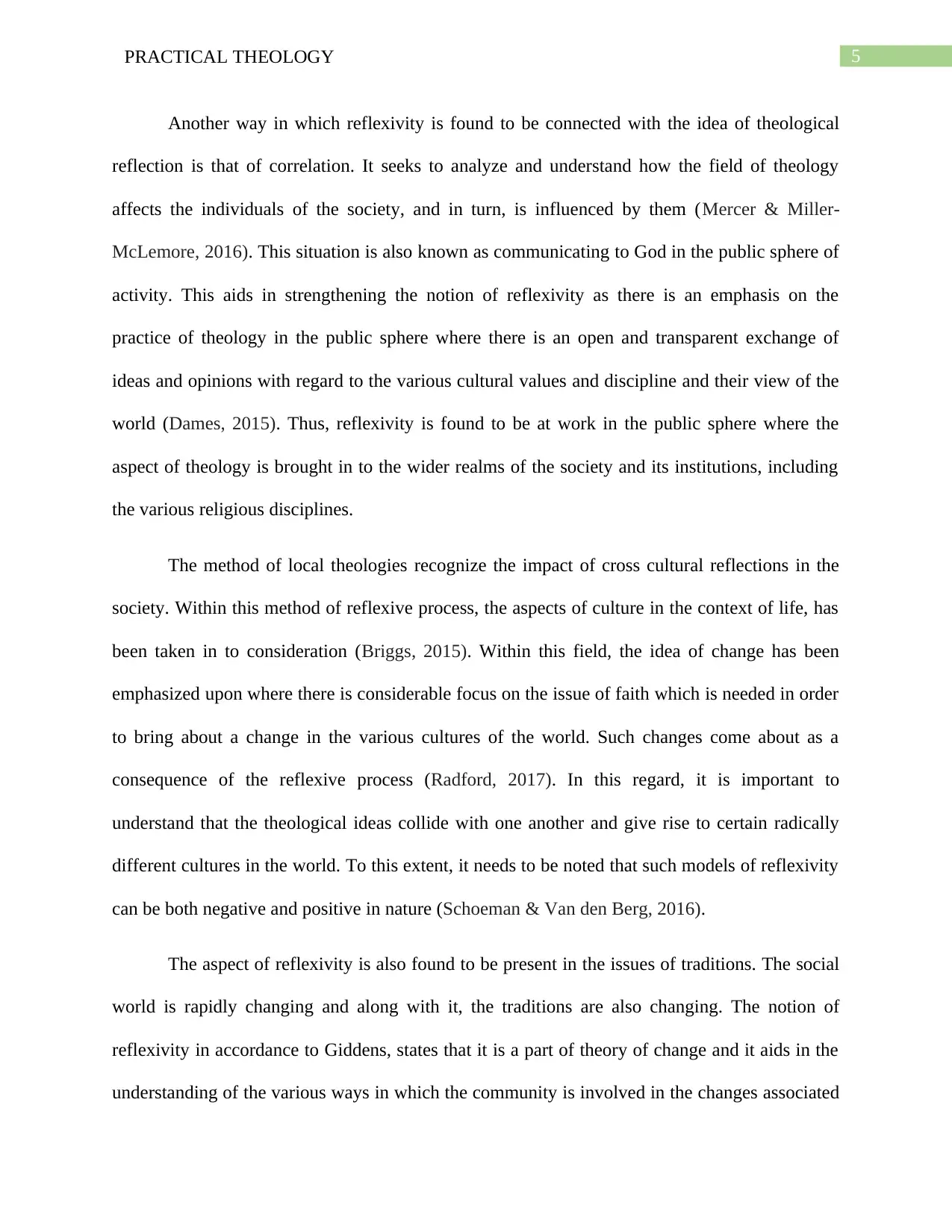
5PRACTICAL THEOLOGY
Another way in which reflexivity is found to be connected with the idea of theological
reflection is that of correlation. It seeks to analyze and understand how the field of theology
affects the individuals of the society, and in turn, is influenced by them (Mercer & Miller-
McLemore, 2016). This situation is also known as communicating to God in the public sphere of
activity. This aids in strengthening the notion of reflexivity as there is an emphasis on the
practice of theology in the public sphere where there is an open and transparent exchange of
ideas and opinions with regard to the various cultural values and discipline and their view of the
world (Dames, 2015). Thus, reflexivity is found to be at work in the public sphere where the
aspect of theology is brought in to the wider realms of the society and its institutions, including
the various religious disciplines.
The method of local theologies recognize the impact of cross cultural reflections in the
society. Within this method of reflexive process, the aspects of culture in the context of life, has
been taken in to consideration (Briggs, 2015). Within this field, the idea of change has been
emphasized upon where there is considerable focus on the issue of faith which is needed in order
to bring about a change in the various cultures of the world. Such changes come about as a
consequence of the reflexive process (Radford, 2017). In this regard, it is important to
understand that the theological ideas collide with one another and give rise to certain radically
different cultures in the world. To this extent, it needs to be noted that such models of reflexivity
can be both negative and positive in nature (Schoeman & Van den Berg, 2016).
The aspect of reflexivity is also found to be present in the issues of traditions. The social
world is rapidly changing and along with it, the traditions are also changing. The notion of
reflexivity in accordance to Giddens, states that it is a part of theory of change and it aids in the
understanding of the various ways in which the community is involved in the changes associated
Another way in which reflexivity is found to be connected with the idea of theological
reflection is that of correlation. It seeks to analyze and understand how the field of theology
affects the individuals of the society, and in turn, is influenced by them (Mercer & Miller-
McLemore, 2016). This situation is also known as communicating to God in the public sphere of
activity. This aids in strengthening the notion of reflexivity as there is an emphasis on the
practice of theology in the public sphere where there is an open and transparent exchange of
ideas and opinions with regard to the various cultural values and discipline and their view of the
world (Dames, 2015). Thus, reflexivity is found to be at work in the public sphere where the
aspect of theology is brought in to the wider realms of the society and its institutions, including
the various religious disciplines.
The method of local theologies recognize the impact of cross cultural reflections in the
society. Within this method of reflexive process, the aspects of culture in the context of life, has
been taken in to consideration (Briggs, 2015). Within this field, the idea of change has been
emphasized upon where there is considerable focus on the issue of faith which is needed in order
to bring about a change in the various cultures of the world. Such changes come about as a
consequence of the reflexive process (Radford, 2017). In this regard, it is important to
understand that the theological ideas collide with one another and give rise to certain radically
different cultures in the world. To this extent, it needs to be noted that such models of reflexivity
can be both negative and positive in nature (Schoeman & Van den Berg, 2016).
The aspect of reflexivity is also found to be present in the issues of traditions. The social
world is rapidly changing and along with it, the traditions are also changing. The notion of
reflexivity in accordance to Giddens, states that it is a part of theory of change and it aids in the
understanding of the various ways in which the community is involved in the changes associated
⊘ This is a preview!⊘
Do you want full access?
Subscribe today to unlock all pages.

Trusted by 1+ million students worldwide
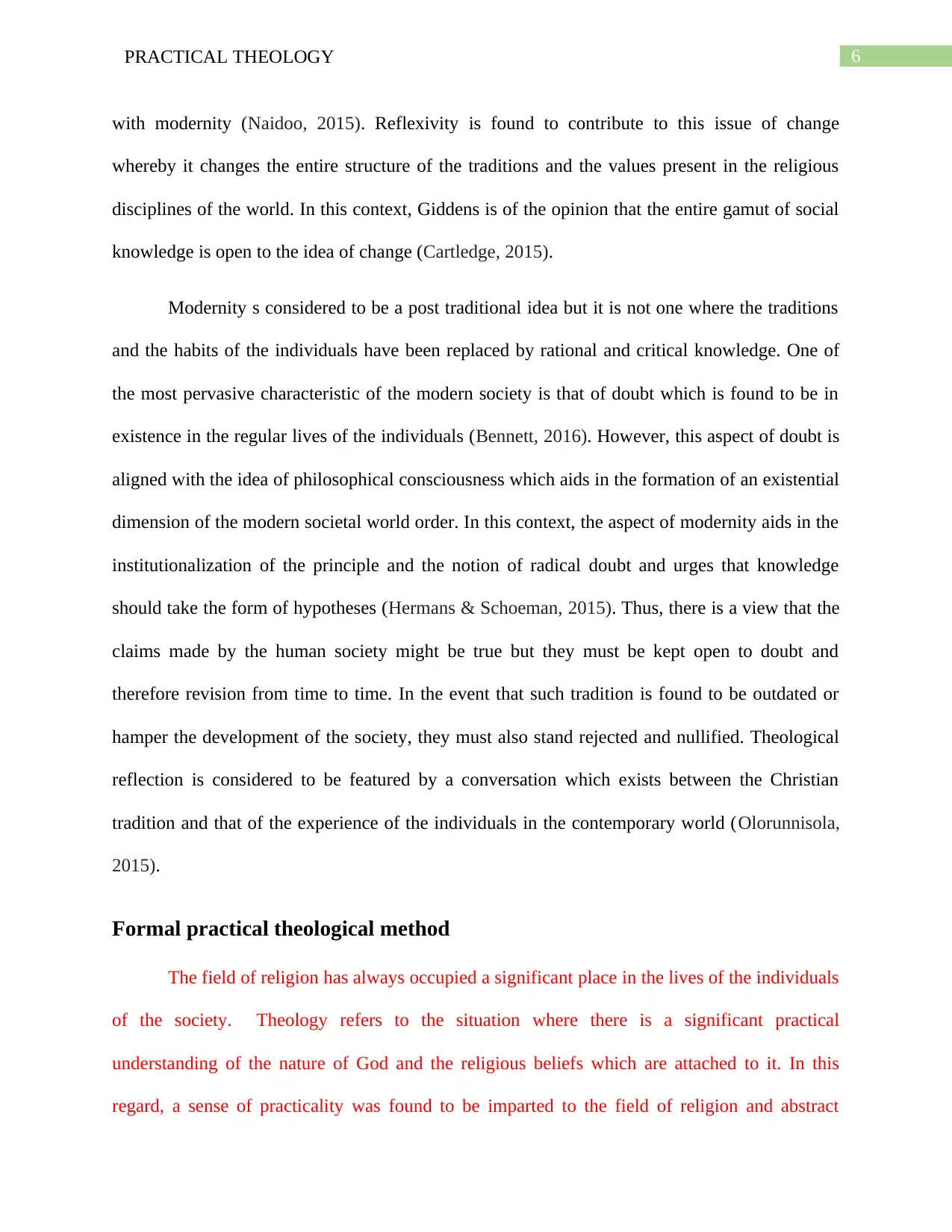
6PRACTICAL THEOLOGY
with modernity (Naidoo, 2015). Reflexivity is found to contribute to this issue of change
whereby it changes the entire structure of the traditions and the values present in the religious
disciplines of the world. In this context, Giddens is of the opinion that the entire gamut of social
knowledge is open to the idea of change (Cartledge, 2015).
Modernity s considered to be a post traditional idea but it is not one where the traditions
and the habits of the individuals have been replaced by rational and critical knowledge. One of
the most pervasive characteristic of the modern society is that of doubt which is found to be in
existence in the regular lives of the individuals (Bennett, 2016). However, this aspect of doubt is
aligned with the idea of philosophical consciousness which aids in the formation of an existential
dimension of the modern societal world order. In this context, the aspect of modernity aids in the
institutionalization of the principle and the notion of radical doubt and urges that knowledge
should take the form of hypotheses (Hermans & Schoeman, 2015). Thus, there is a view that the
claims made by the human society might be true but they must be kept open to doubt and
therefore revision from time to time. In the event that such tradition is found to be outdated or
hamper the development of the society, they must also stand rejected and nullified. Theological
reflection is considered to be featured by a conversation which exists between the Christian
tradition and that of the experience of the individuals in the contemporary world (Olorunnisola,
2015).
Formal practical theological method
The field of religion has always occupied a significant place in the lives of the individuals
of the society. Theology refers to the situation where there is a significant practical
understanding of the nature of God and the religious beliefs which are attached to it. In this
regard, a sense of practicality was found to be imparted to the field of religion and abstract
with modernity (Naidoo, 2015). Reflexivity is found to contribute to this issue of change
whereby it changes the entire structure of the traditions and the values present in the religious
disciplines of the world. In this context, Giddens is of the opinion that the entire gamut of social
knowledge is open to the idea of change (Cartledge, 2015).
Modernity s considered to be a post traditional idea but it is not one where the traditions
and the habits of the individuals have been replaced by rational and critical knowledge. One of
the most pervasive characteristic of the modern society is that of doubt which is found to be in
existence in the regular lives of the individuals (Bennett, 2016). However, this aspect of doubt is
aligned with the idea of philosophical consciousness which aids in the formation of an existential
dimension of the modern societal world order. In this context, the aspect of modernity aids in the
institutionalization of the principle and the notion of radical doubt and urges that knowledge
should take the form of hypotheses (Hermans & Schoeman, 2015). Thus, there is a view that the
claims made by the human society might be true but they must be kept open to doubt and
therefore revision from time to time. In the event that such tradition is found to be outdated or
hamper the development of the society, they must also stand rejected and nullified. Theological
reflection is considered to be featured by a conversation which exists between the Christian
tradition and that of the experience of the individuals in the contemporary world (Olorunnisola,
2015).
Formal practical theological method
The field of religion has always occupied a significant place in the lives of the individuals
of the society. Theology refers to the situation where there is a significant practical
understanding of the nature of God and the religious beliefs which are attached to it. In this
regard, a sense of practicality was found to be imparted to the field of religion and abstract
Paraphrase This Document
Need a fresh take? Get an instant paraphrase of this document with our AI Paraphraser
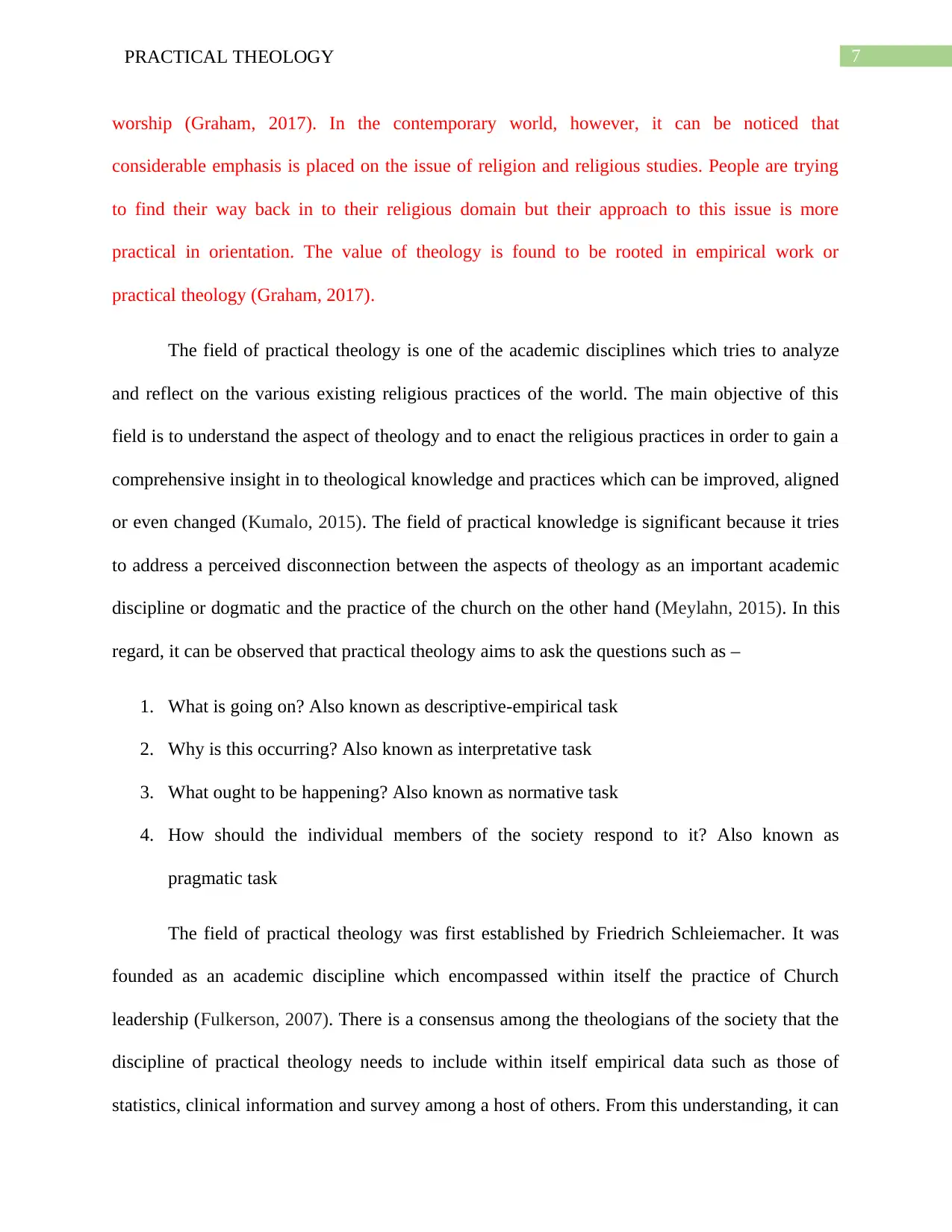
7PRACTICAL THEOLOGY
worship (Graham, 2017). In the contemporary world, however, it can be noticed that
considerable emphasis is placed on the issue of religion and religious studies. People are trying
to find their way back in to their religious domain but their approach to this issue is more
practical in orientation. The value of theology is found to be rooted in empirical work or
practical theology (Graham, 2017).
The field of practical theology is one of the academic disciplines which tries to analyze
and reflect on the various existing religious practices of the world. The main objective of this
field is to understand the aspect of theology and to enact the religious practices in order to gain a
comprehensive insight in to theological knowledge and practices which can be improved, aligned
or even changed (Kumalo, 2015). The field of practical knowledge is significant because it tries
to address a perceived disconnection between the aspects of theology as an important academic
discipline or dogmatic and the practice of the church on the other hand (Meylahn, 2015). In this
regard, it can be observed that practical theology aims to ask the questions such as –
1. What is going on? Also known as descriptive-empirical task
2. Why is this occurring? Also known as interpretative task
3. What ought to be happening? Also known as normative task
4. How should the individual members of the society respond to it? Also known as
pragmatic task
The field of practical theology was first established by Friedrich Schleiemacher. It was
founded as an academic discipline which encompassed within itself the practice of Church
leadership (Fulkerson, 2007). There is a consensus among the theologians of the society that the
discipline of practical theology needs to include within itself empirical data such as those of
statistics, clinical information and survey among a host of others. From this understanding, it can
worship (Graham, 2017). In the contemporary world, however, it can be noticed that
considerable emphasis is placed on the issue of religion and religious studies. People are trying
to find their way back in to their religious domain but their approach to this issue is more
practical in orientation. The value of theology is found to be rooted in empirical work or
practical theology (Graham, 2017).
The field of practical theology is one of the academic disciplines which tries to analyze
and reflect on the various existing religious practices of the world. The main objective of this
field is to understand the aspect of theology and to enact the religious practices in order to gain a
comprehensive insight in to theological knowledge and practices which can be improved, aligned
or even changed (Kumalo, 2015). The field of practical knowledge is significant because it tries
to address a perceived disconnection between the aspects of theology as an important academic
discipline or dogmatic and the practice of the church on the other hand (Meylahn, 2015). In this
regard, it can be observed that practical theology aims to ask the questions such as –
1. What is going on? Also known as descriptive-empirical task
2. Why is this occurring? Also known as interpretative task
3. What ought to be happening? Also known as normative task
4. How should the individual members of the society respond to it? Also known as
pragmatic task
The field of practical theology was first established by Friedrich Schleiemacher. It was
founded as an academic discipline which encompassed within itself the practice of Church
leadership (Fulkerson, 2007). There is a consensus among the theologians of the society that the
discipline of practical theology needs to include within itself empirical data such as those of
statistics, clinical information and survey among a host of others. From this understanding, it can
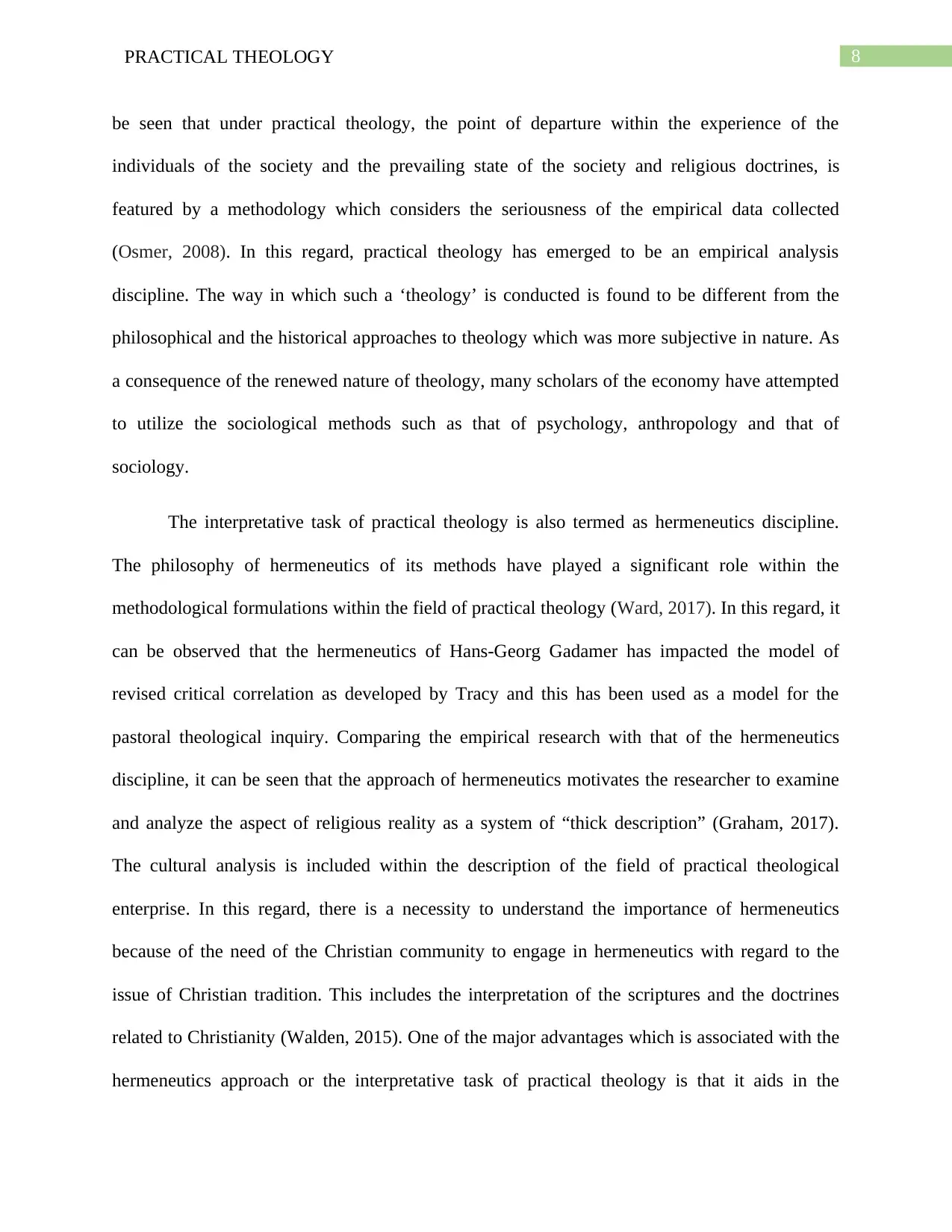
8PRACTICAL THEOLOGY
be seen that under practical theology, the point of departure within the experience of the
individuals of the society and the prevailing state of the society and religious doctrines, is
featured by a methodology which considers the seriousness of the empirical data collected
(Osmer, 2008). In this regard, practical theology has emerged to be an empirical analysis
discipline. The way in which such a ‘theology’ is conducted is found to be different from the
philosophical and the historical approaches to theology which was more subjective in nature. As
a consequence of the renewed nature of theology, many scholars of the economy have attempted
to utilize the sociological methods such as that of psychology, anthropology and that of
sociology.
The interpretative task of practical theology is also termed as hermeneutics discipline.
The philosophy of hermeneutics of its methods have played a significant role within the
methodological formulations within the field of practical theology (Ward, 2017). In this regard, it
can be observed that the hermeneutics of Hans-Georg Gadamer has impacted the model of
revised critical correlation as developed by Tracy and this has been used as a model for the
pastoral theological inquiry. Comparing the empirical research with that of the hermeneutics
discipline, it can be seen that the approach of hermeneutics motivates the researcher to examine
and analyze the aspect of religious reality as a system of “thick description” (Graham, 2017).
The cultural analysis is included within the description of the field of practical theological
enterprise. In this regard, there is a necessity to understand the importance of hermeneutics
because of the need of the Christian community to engage in hermeneutics with regard to the
issue of Christian tradition. This includes the interpretation of the scriptures and the doctrines
related to Christianity (Walden, 2015). One of the major advantages which is associated with the
hermeneutics approach or the interpretative task of practical theology is that it aids in the
be seen that under practical theology, the point of departure within the experience of the
individuals of the society and the prevailing state of the society and religious doctrines, is
featured by a methodology which considers the seriousness of the empirical data collected
(Osmer, 2008). In this regard, practical theology has emerged to be an empirical analysis
discipline. The way in which such a ‘theology’ is conducted is found to be different from the
philosophical and the historical approaches to theology which was more subjective in nature. As
a consequence of the renewed nature of theology, many scholars of the economy have attempted
to utilize the sociological methods such as that of psychology, anthropology and that of
sociology.
The interpretative task of practical theology is also termed as hermeneutics discipline.
The philosophy of hermeneutics of its methods have played a significant role within the
methodological formulations within the field of practical theology (Ward, 2017). In this regard, it
can be observed that the hermeneutics of Hans-Georg Gadamer has impacted the model of
revised critical correlation as developed by Tracy and this has been used as a model for the
pastoral theological inquiry. Comparing the empirical research with that of the hermeneutics
discipline, it can be seen that the approach of hermeneutics motivates the researcher to examine
and analyze the aspect of religious reality as a system of “thick description” (Graham, 2017).
The cultural analysis is included within the description of the field of practical theological
enterprise. In this regard, there is a necessity to understand the importance of hermeneutics
because of the need of the Christian community to engage in hermeneutics with regard to the
issue of Christian tradition. This includes the interpretation of the scriptures and the doctrines
related to Christianity (Walden, 2015). One of the major advantages which is associated with the
hermeneutics approach or the interpretative task of practical theology is that it aids in the
⊘ This is a preview!⊘
Do you want full access?
Subscribe today to unlock all pages.

Trusted by 1+ million students worldwide
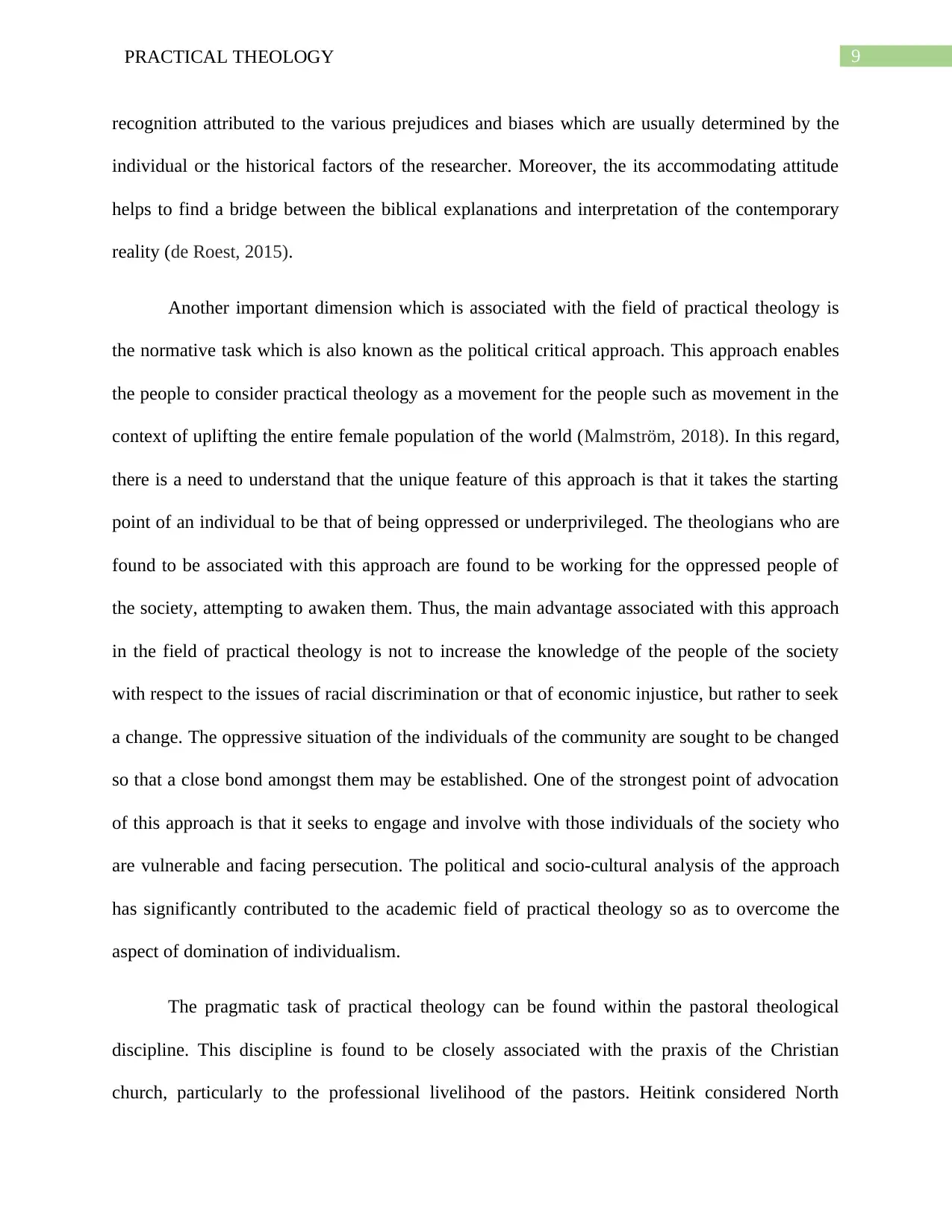
9PRACTICAL THEOLOGY
recognition attributed to the various prejudices and biases which are usually determined by the
individual or the historical factors of the researcher. Moreover, the its accommodating attitude
helps to find a bridge between the biblical explanations and interpretation of the contemporary
reality (de Roest, 2015).
Another important dimension which is associated with the field of practical theology is
the normative task which is also known as the political critical approach. This approach enables
the people to consider practical theology as a movement for the people such as movement in the
context of uplifting the entire female population of the world (Malmström, 2018). In this regard,
there is a need to understand that the unique feature of this approach is that it takes the starting
point of an individual to be that of being oppressed or underprivileged. The theologians who are
found to be associated with this approach are found to be working for the oppressed people of
the society, attempting to awaken them. Thus, the main advantage associated with this approach
in the field of practical theology is not to increase the knowledge of the people of the society
with respect to the issues of racial discrimination or that of economic injustice, but rather to seek
a change. The oppressive situation of the individuals of the community are sought to be changed
so that a close bond amongst them may be established. One of the strongest point of advocation
of this approach is that it seeks to engage and involve with those individuals of the society who
are vulnerable and facing persecution. The political and socio-cultural analysis of the approach
has significantly contributed to the academic field of practical theology so as to overcome the
aspect of domination of individualism.
The pragmatic task of practical theology can be found within the pastoral theological
discipline. This discipline is found to be closely associated with the praxis of the Christian
church, particularly to the professional livelihood of the pastors. Heitink considered North
recognition attributed to the various prejudices and biases which are usually determined by the
individual or the historical factors of the researcher. Moreover, the its accommodating attitude
helps to find a bridge between the biblical explanations and interpretation of the contemporary
reality (de Roest, 2015).
Another important dimension which is associated with the field of practical theology is
the normative task which is also known as the political critical approach. This approach enables
the people to consider practical theology as a movement for the people such as movement in the
context of uplifting the entire female population of the world (Malmström, 2018). In this regard,
there is a need to understand that the unique feature of this approach is that it takes the starting
point of an individual to be that of being oppressed or underprivileged. The theologians who are
found to be associated with this approach are found to be working for the oppressed people of
the society, attempting to awaken them. Thus, the main advantage associated with this approach
in the field of practical theology is not to increase the knowledge of the people of the society
with respect to the issues of racial discrimination or that of economic injustice, but rather to seek
a change. The oppressive situation of the individuals of the community are sought to be changed
so that a close bond amongst them may be established. One of the strongest point of advocation
of this approach is that it seeks to engage and involve with those individuals of the society who
are vulnerable and facing persecution. The political and socio-cultural analysis of the approach
has significantly contributed to the academic field of practical theology so as to overcome the
aspect of domination of individualism.
The pragmatic task of practical theology can be found within the pastoral theological
discipline. This discipline is found to be closely associated with the praxis of the Christian
church, particularly to the professional livelihood of the pastors. Heitink considered North
Paraphrase This Document
Need a fresh take? Get an instant paraphrase of this document with our AI Paraphraser
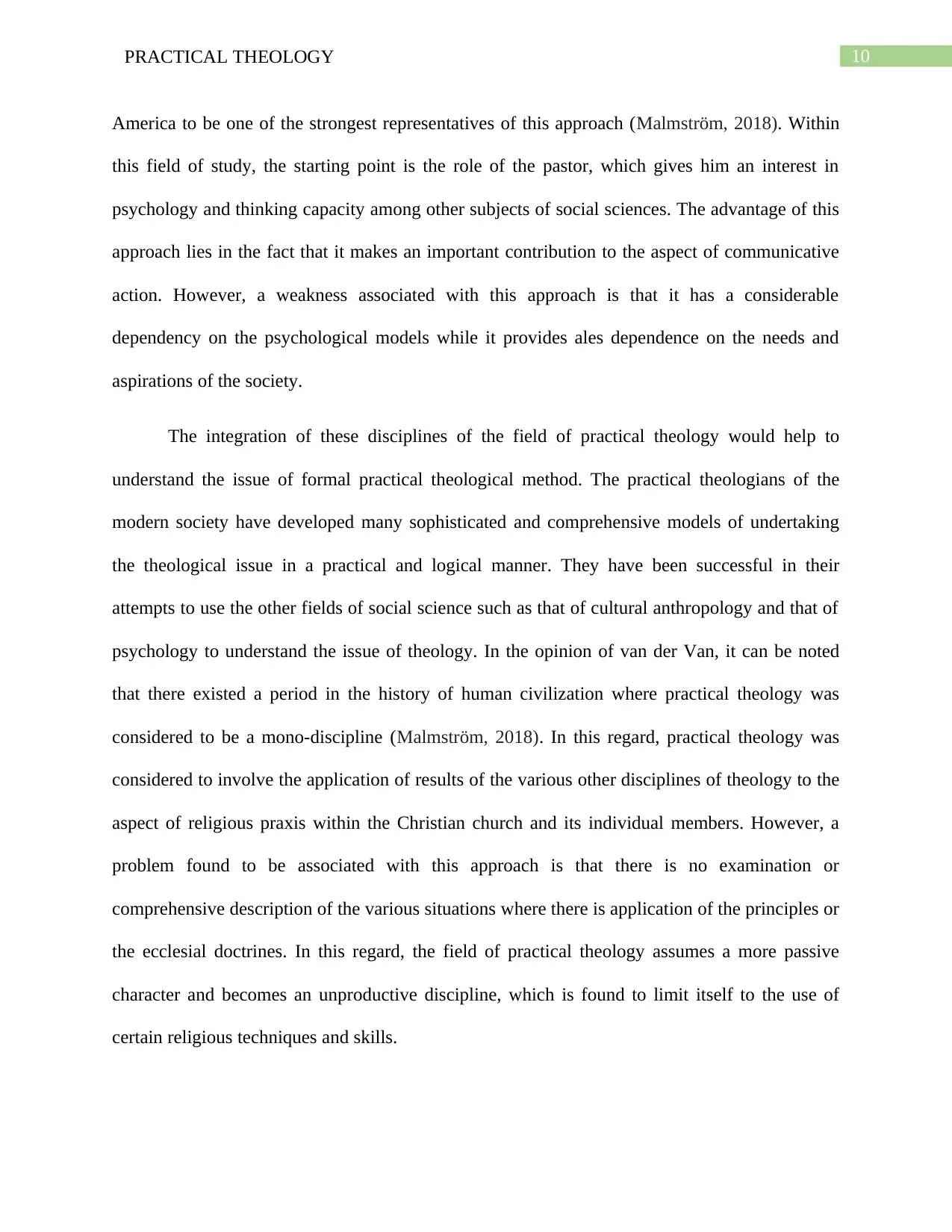
10PRACTICAL THEOLOGY
America to be one of the strongest representatives of this approach (Malmström, 2018). Within
this field of study, the starting point is the role of the pastor, which gives him an interest in
psychology and thinking capacity among other subjects of social sciences. The advantage of this
approach lies in the fact that it makes an important contribution to the aspect of communicative
action. However, a weakness associated with this approach is that it has a considerable
dependency on the psychological models while it provides ales dependence on the needs and
aspirations of the society.
The integration of these disciplines of the field of practical theology would help to
understand the issue of formal practical theological method. The practical theologians of the
modern society have developed many sophisticated and comprehensive models of undertaking
the theological issue in a practical and logical manner. They have been successful in their
attempts to use the other fields of social science such as that of cultural anthropology and that of
psychology to understand the issue of theology. In the opinion of van der Van, it can be noted
that there existed a period in the history of human civilization where practical theology was
considered to be a mono-discipline (Malmström, 2018). In this regard, practical theology was
considered to involve the application of results of the various other disciplines of theology to the
aspect of religious praxis within the Christian church and its individual members. However, a
problem found to be associated with this approach is that there is no examination or
comprehensive description of the various situations where there is application of the principles or
the ecclesial doctrines. In this regard, the field of practical theology assumes a more passive
character and becomes an unproductive discipline, which is found to limit itself to the use of
certain religious techniques and skills.
America to be one of the strongest representatives of this approach (Malmström, 2018). Within
this field of study, the starting point is the role of the pastor, which gives him an interest in
psychology and thinking capacity among other subjects of social sciences. The advantage of this
approach lies in the fact that it makes an important contribution to the aspect of communicative
action. However, a weakness associated with this approach is that it has a considerable
dependency on the psychological models while it provides ales dependence on the needs and
aspirations of the society.
The integration of these disciplines of the field of practical theology would help to
understand the issue of formal practical theological method. The practical theologians of the
modern society have developed many sophisticated and comprehensive models of undertaking
the theological issue in a practical and logical manner. They have been successful in their
attempts to use the other fields of social science such as that of cultural anthropology and that of
psychology to understand the issue of theology. In the opinion of van der Van, it can be noted
that there existed a period in the history of human civilization where practical theology was
considered to be a mono-discipline (Malmström, 2018). In this regard, practical theology was
considered to involve the application of results of the various other disciplines of theology to the
aspect of religious praxis within the Christian church and its individual members. However, a
problem found to be associated with this approach is that there is no examination or
comprehensive description of the various situations where there is application of the principles or
the ecclesial doctrines. In this regard, the field of practical theology assumes a more passive
character and becomes an unproductive discipline, which is found to limit itself to the use of
certain religious techniques and skills.
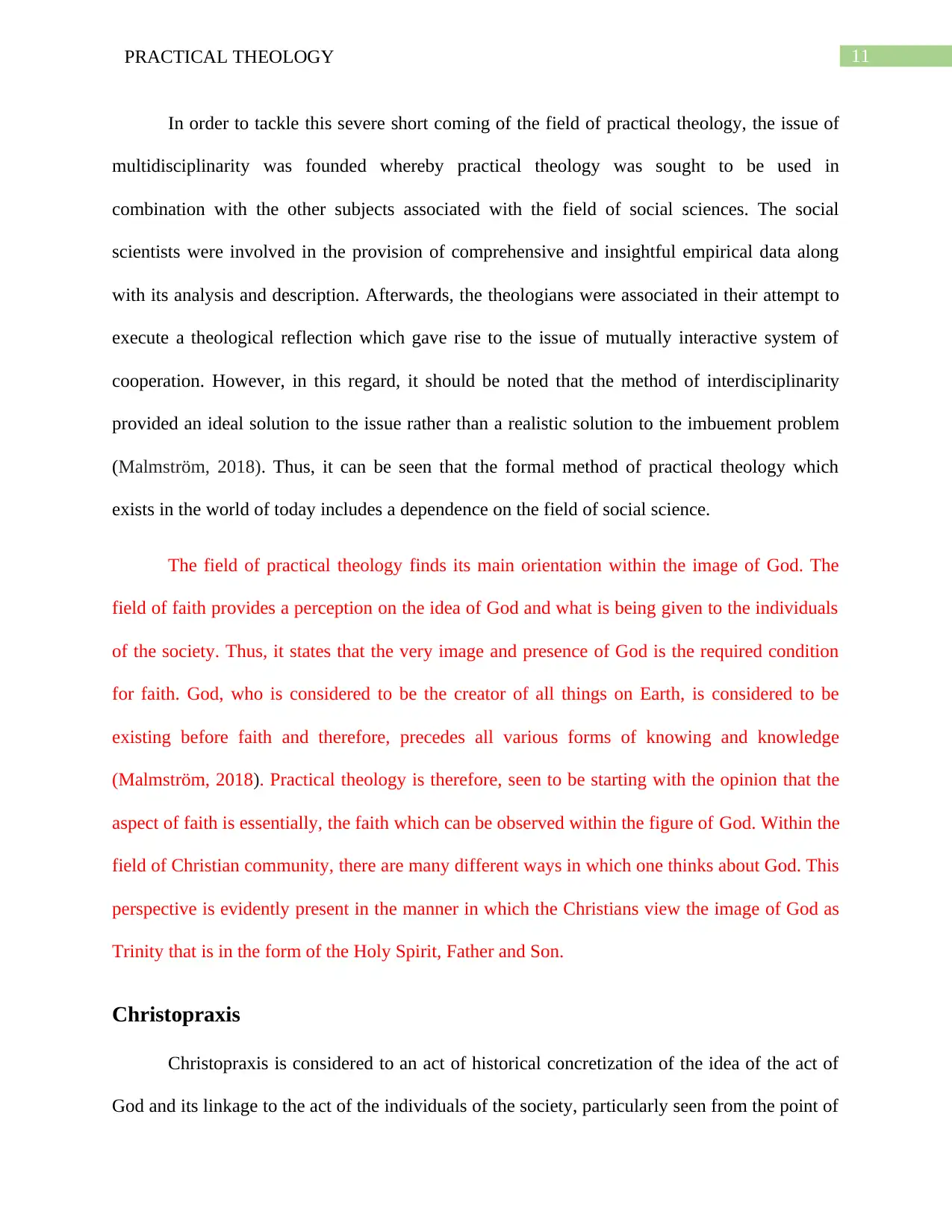
11PRACTICAL THEOLOGY
In order to tackle this severe short coming of the field of practical theology, the issue of
multidisciplinarity was founded whereby practical theology was sought to be used in
combination with the other subjects associated with the field of social sciences. The social
scientists were involved in the provision of comprehensive and insightful empirical data along
with its analysis and description. Afterwards, the theologians were associated in their attempt to
execute a theological reflection which gave rise to the issue of mutually interactive system of
cooperation. However, in this regard, it should be noted that the method of interdisciplinarity
provided an ideal solution to the issue rather than a realistic solution to the imbuement problem
(Malmström, 2018). Thus, it can be seen that the formal method of practical theology which
exists in the world of today includes a dependence on the field of social science.
The field of practical theology finds its main orientation within the image of God. The
field of faith provides a perception on the idea of God and what is being given to the individuals
of the society. Thus, it states that the very image and presence of God is the required condition
for faith. God, who is considered to be the creator of all things on Earth, is considered to be
existing before faith and therefore, precedes all various forms of knowing and knowledge
(Malmström, 2018). Practical theology is therefore, seen to be starting with the opinion that the
aspect of faith is essentially, the faith which can be observed within the figure of God. Within the
field of Christian community, there are many different ways in which one thinks about God. This
perspective is evidently present in the manner in which the Christians view the image of God as
Trinity that is in the form of the Holy Spirit, Father and Son.
Christopraxis
Christopraxis is considered to an act of historical concretization of the idea of the act of
God and its linkage to the act of the individuals of the society, particularly seen from the point of
In order to tackle this severe short coming of the field of practical theology, the issue of
multidisciplinarity was founded whereby practical theology was sought to be used in
combination with the other subjects associated with the field of social sciences. The social
scientists were involved in the provision of comprehensive and insightful empirical data along
with its analysis and description. Afterwards, the theologians were associated in their attempt to
execute a theological reflection which gave rise to the issue of mutually interactive system of
cooperation. However, in this regard, it should be noted that the method of interdisciplinarity
provided an ideal solution to the issue rather than a realistic solution to the imbuement problem
(Malmström, 2018). Thus, it can be seen that the formal method of practical theology which
exists in the world of today includes a dependence on the field of social science.
The field of practical theology finds its main orientation within the image of God. The
field of faith provides a perception on the idea of God and what is being given to the individuals
of the society. Thus, it states that the very image and presence of God is the required condition
for faith. God, who is considered to be the creator of all things on Earth, is considered to be
existing before faith and therefore, precedes all various forms of knowing and knowledge
(Malmström, 2018). Practical theology is therefore, seen to be starting with the opinion that the
aspect of faith is essentially, the faith which can be observed within the figure of God. Within the
field of Christian community, there are many different ways in which one thinks about God. This
perspective is evidently present in the manner in which the Christians view the image of God as
Trinity that is in the form of the Holy Spirit, Father and Son.
Christopraxis
Christopraxis is considered to an act of historical concretization of the idea of the act of
God and its linkage to the act of the individuals of the society, particularly seen from the point of
⊘ This is a preview!⊘
Do you want full access?
Subscribe today to unlock all pages.

Trusted by 1+ million students worldwide
1 out of 21
Related Documents
Your All-in-One AI-Powered Toolkit for Academic Success.
+13062052269
info@desklib.com
Available 24*7 on WhatsApp / Email
![[object Object]](/_next/static/media/star-bottom.7253800d.svg)
Unlock your academic potential
Copyright © 2020–2026 A2Z Services. All Rights Reserved. Developed and managed by ZUCOL.



